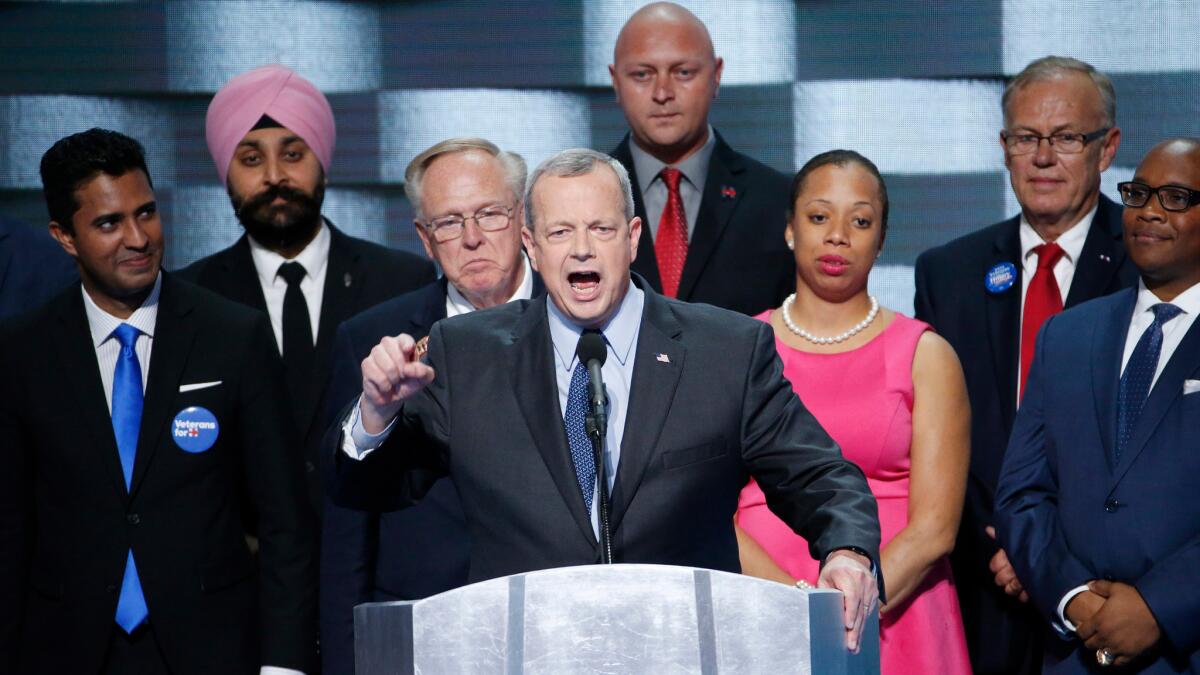Column: How Clinton and Trump are trying to frame the election

- Share via
The first task of any political campaign is to frame the question it wants voters to answer. Donald Trump wants this election to be a referendum on change: Are you happy with the way things are going in America? Hillary Clinton wants the election to be a referendum on Trump: Are you ready to hand the nuclear codes to an authoritarian with a hair-trigger temper?
There’s more to the campaign, of course: conflicting worldviews, competing policies. But the battle to frame the question was a significant part of what the conventions in Cleveland and Philadelphia were about. Trump’s message was that the United States is in crisis and that he alone can change its course; Clinton’s was that the country’s problems are solvable, but Trump doesn’t have the temperament to be commander in chief.
For the record:
12:32 p.m. Jan. 19, 2025This article originally stated that, according to an NBC News/Wall Street Journal poll, 46% of voters said they preferred “a steady approach” with fewer changes. The correct number is 41%.
Both questions are potentially effective.
The desire for Big Change is broad and deep; in the most recent Pew Research Center poll, 71% of Americans said they are unsatisfied with the country’s direction. That’s what has propelled Trump’s candidacy.
From the beginning, Trump has cast himself as an iconoclastic – indeed, gleefully disruptive – change-maker: a non-politician who denounced the establishments of both parties and promised to scrap traditional policies on everything from the federal debt to trade.
The Pew poll found that 77% of voters were convinced that he would bring about real change – although most of them thought the change would be for the worse.
When it comes to change, Trump can fairly claim to own the brand.
Democratic pollster Geoff Garin, who works for Clinton’s SuperPAC, Priorities USA, says satisfying the thirst for change is probably his candidate’s biggest challenge. He pointed to an NBC News/Wall Street Journal poll in which 56% of voters said they preferred a candidate who will “bring major changes to the way government operates,” even if the changes are unpredictable; only 41% said they preferred “a steady approach” with fewer changes.
Clinton’s task, he said, is to persuade voters “that she will make [voters’] lives better as president.”
That was, of course, a theme in Philadelphia – but only one of many; it’s not clear that it broke through the clutter.
Instead of change, Clinton wants to focus on Trump’s temperament, his biggest flaw in voters’ eyes.
It’s an important pitch for two kinds of voters: white working-class men and women who have felt neglected by the Obama administration, and Bernie Sanders voters, especially young people, who aren’t enthusiastic about turning out for Clinton.
But some are skeptical that she can get there at all. “I don’t think she can plausibly campaign as the candidate of change,” David Axelrod, Obama’s chief strategist in 2008, told me. “She has been a fixture in American politics for such a long time.”
Instead of change, Clinton wants to focus on Trump’s temperament, his biggest flaw in voters’ eyes. In the NBC-Wall Street Journal poll, voters said that was their top concern about the Republican; 65% called him “too volatile,” slightly ahead of the percentage who called him “offensive and intolerant.” (Clinton’s biggest flaw was “dishonest,” at 69%, followed by “won’t make needed changes.”)
“This issue of temperament is central to the whole debate,” Axelrod said.
He cited a line from Clinton’s speech: “A man you can bait with a tweet is not a man you can trust with nuclear weapons.”
“I really think the race comes down to this,” he said. “This is the critique I think that has the power to move the most people.”
Indeed, Clinton devoted more than twice as much time in her speech to lambasting Trump as to outlining her plans for the economy.
Trump doesn’t seem to notice that his bull-in-a-china-shop style makes voters worry that he’d be a bad fit for the White House.
His own wife has beseeched him to be “more presidential,” but he’s ignored the advice. Instead, he has frequently disrupted his own campaign – most recently by suggesting that Russia should hack into Clinton’s private email server. (He later said he was joking.)
So it shouldn’t be hard for Clinton and her surrogates to keep the question of his temperament alive.
But that hasn’t knocked him out of the race; far from it. Judging from the head-to-head polls, “change” is narrowly beating “temperament” as the top question on voters’ minds. As long as that’s true, Trump – for all his gargantuan flaws – has a real chance to win.
Twitter: @DoyleMcManus
Follow the Opinion section on Twitter @latimesopinion and Facebook
MORE FROM OPINION
We adjust for population with murder rates. Why not for mass shootings?
Why borders matter — and a borderless world is a fantasy
Are we raising a generation of nature-phobic kids?
More to Read
A cure for the common opinion
Get thought-provoking perspectives with our weekly newsletter.
You may occasionally receive promotional content from the Los Angeles Times.











